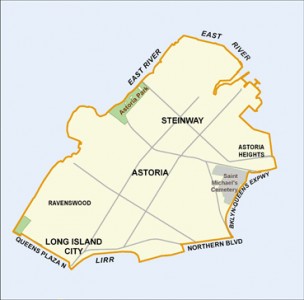
Jan. 14, 2015 By Christian Murray and Michael Florio
The Chairman of Astoria’s Community Board 1 Vinicio Donato has held the top job since 1979.
Meanwhile, all the leading figures on the Community Board 1 have been there since the 1980s—including those in charge of zoning and overseeing liquor licenses.
The first vice chair George Stamatiades was appointed in 1982; second vice chair Norma Nieves-Blas was put on the board in 1987; the head of the Zoning & Variance Committee John Carusone joined in 1988; and the head of the public safety committee Antonio Meloni has been a member since 1988.
This scenario of long-serving board members holding key posts is very common throughout the city– and some legislators are looking to change that.
Councilman Daniel Dromm (Jackson Heights) introduced legislation in December that would limit the amount of time a board member could serve to six two-year terms (12 years). The legislation would only apply to board members appointed after April 1, 2016.
Existing board members would not be affected by the bill and would be able to stay as long as they desire—as long as their attendance records are in order.
“I applaud those board members who have served for 30 or 40 years but I think we need to start thinking about changing things up a bit,” Dromm said.
Councilman Jimmy Van Bramer, who represents Sunnyside/Woodside/LIC as well as a section of Astoria, is one of seven other legislators who has co-sponsored the bill. Councilman Costa Constantinides is not a co-sponsor and declined to comment on the legislation for this article.
Dromm said that New York has undergone a great deal of change in the past 30 years and that should be reflected in terms of who sits on the community board. He said that when people sit on boards for three and four decades it creates a “huge power structure” that doesn’t always benefit a changing community.
The same people stay in charge, he said, since the new members don’t want to challenge the long-serving chair person or executive board members. “While new members do get appointed to the [50 person] boards each year, they rarely get into powerful positions or on the executive board,” Dromm said.
“These [chair] people wield a lot of power,” Dromm told the Sunnyside Post last year, since they decide who heads the committees and who is on them (see bylaws below). “They have a significant amount of power over the direction of the community.”
Van Bramer, a former Community Board 2 member, said that the “changing of the guard is healthy and it represents good-government and democracy.”
He said that council members are term limited and so too is the president of the United States. Therefore he believes that they should apply to community board members too.
Van Bramer said that he supports the bill since it isn’t aimed at removing existing board members or punishing them. “We all value their volunteerism and what they have done.”
However, Van Bramer said that more people should have an opportunity to serve on the board.

Daniel Dromm
He noted that there are about 30 people looking to get on Community Board 2 yet only a few spots open up each year.
Community Board members are appointed by the borough president, with half the nominees coming from the council member from a given district.
Each board member has a two year term and then has to be reappointed by the borough president. The members are almost universally reappointed unless they have poor attendance records.
The amount of work a member does on the board is not measured, nor is their attendance at committee meetings. Therefore, a member could go to most of the monthly meetings, say or doing little and still be reappointed.
However, those opposed to Dromm’s bill argue that the long-serving members have accumulated an enormous amount of knowledge that helps the board tackle complex topics.
“I am opposed to term limits because there is value in experience and the history of many issues that come before the board,” said Community Board 1 Chair Vinicio Donato in a statement.
Manhattan Borough President Gale Brewer, who served on Community Board 7, told the Gotham Gazette in December that developers often present boards with complicated land-use proposals and that it often takes experienced board members to grasp it all.
Furthermore, Brewer said that seasoned board members are better able to negotiate with developers when it comes to affordable housing and other public amenities.
“Without that kind of expertise, the developers will have a field day,” Brewer told the Gazette. She does not support of the bill.
Meanwhile, Queens Borough President Melinda Katz also opposes Dromm’s bill and does not believe in the concept of term limits for board members, according to her spokesman.
Lisa Deller, who is the land use committee head at Community Board 2, told the SunnysidePost last year that it took her a long time to get up to speed with how the city planning process works as well as other city issues. She said that unless someone is a land-use attorney, it takes years to work out all the nuances.
“I think [term limits] would diminish the power of the community board,” Deller said. She said it would increase participation but members would be term limited once they developed a level of expertise.”
However, Dromm said that the community board managers have the institutional knowledge and contacts– and that the board members should be able to confer with them.
Furthermore, the senior members can help mentor the new members.
Patrick O’Brien, who was recently voted in as the chairman of Community Board 2, said “like anything there are always two sides to every equation.”
“Turnover and involvement of new people is always a good thing, whether it is due to term limits or other reasons, but the loss of quality people who have developed relationships over the years with agencies…would be missed.”
He said that 12 years is “too long” for those board members who do little. However, “someone who has done a great deal and continues to do so in a really great way, well then 12 years is a hard limit—despite people thinking it is a good thing.”
“In some scenarios term limits are a good. In others it would be a real loss to the community and the community board,” O’Brien said.
.
